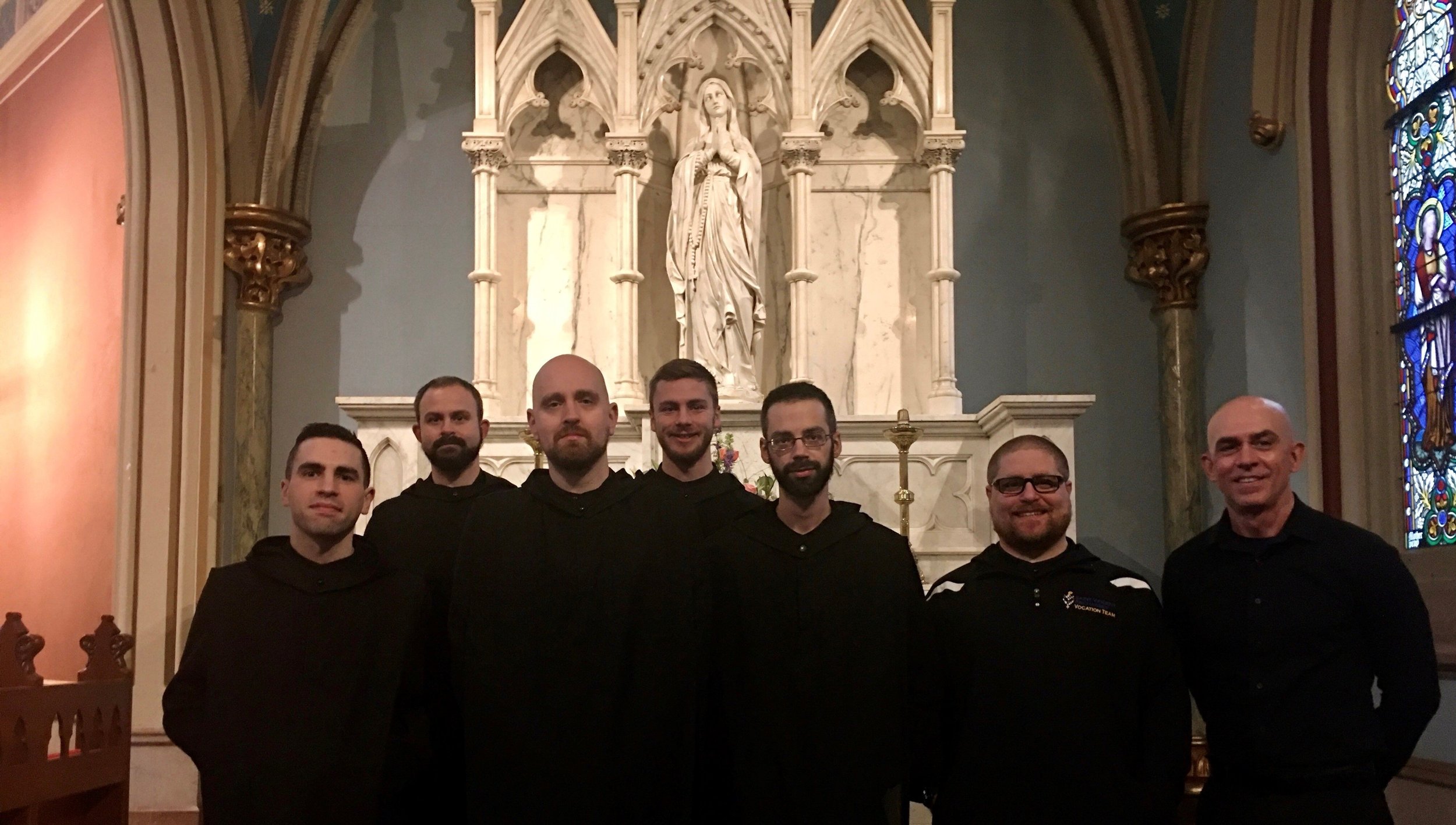Four and Twenty Blackbirds
Years ago, I read somewhere that the line, “Four and twenty blackbirds,” in, “Sing a Song of Sixpence,” refers to Benedictine monks, whose religious habits are black. Whether that interpretation is correct doesn’t matter, because it gives me a way to begin answering people who ask about my life as a Benedictine brother.
Probably a more serious way to begin would be to dispel romantic illusions about what it is like being a monk (Or nun, for that matter, but I won’t presume to speak for the sisters). Men reading these words, please think of all the men you work with. Now, imagine living with them in the same building, eating every meal with them, and going to church with them, every single day of the year. If you can summon up such a scenario, you have gone a long way to seeing what it means to be a monk.
When adjusting to monastic life, self-awareness, without self-absorption, becomes important. It serves as part of what in Benedictine parlance is called conversatio morum, maybe best paraphrased into modern English as, “ongoing conversion.” Along with obedience and stability, it is one of the three vows Benedictines make. Saint Benedict in his Rule called his monastery, “a school for the Lord’s service,” and there is always something to learn about God and about oneself. The main lesson, however, is that of Saint John the Baptist: “He must increase, and I must decrease.”
What may appear from the outside to be a serene holy card ideal is from the inside brimming with the mundane beauty of real life. A monastery like ours that runs a college and a seminary and whose abbey church is also a parish church is going to have its hectic times. Moreover, there will always be a construction or maintenance project banging away. Not to mention the noise from the grounds crew mowing the lawns in summer and removing snow in winter.
Benedictine monks at St. Vincent Archabbey
Daily life also includes death. A year before I entered the monastery, a monk in his thirties died suddenly of a congenital heart defect; he was dead before he hit the floor. Nineteen years later, indelibly impressed on my memory is seeing the blood flowing on the brick pavement in front of our church when a monk in his nineties fell and cracked his skull.
Far less gruesome, when I was a novice, the abbot of another Benedictine abbey gave our monastery’s annual retreat. “I don’t care if my monks are ready to be martyred,” he told us, adding, “What I care about is whether they’re going to clean the lint out of the dryer when they’re done.”
With comparable realism, Saint Benedict used in his Rule a lot of military imagery. An earlier monastic rule that he drew upon was by Saint Pachomius, an Egyptian who in his pre-monk days had been a Roman soldier. As with a military unit, monks must learn to think of themselves as a “band of brothers.” We look out for each other, and we support one another. We congratulate each other on our achievements and console one another when we are grieving. All the same, if you are my brother and you commit a crime, I’m calling the cops, and I would expect you to do the same for me. Gone are the days, days that should never have been, of thinking it helps the Church to circumvent the just laws of the state.
When considering the military aspect of the Benedictine Rule, a significant feature is the vow of obedience. To some modern people, all religious vows seem freighted with Orwellian Newspeak: Obedience is Freedom; Poverty is Riches; Chastity is Fulfillment. Although at times it can simply mean “Shut up and do what you’re told,” obedience can be freeing, so that, for example, following (obeying) a set schedule frees one from having to reinvent every hour from scratch. It can also help remind us that time is a fellow creature, a gift from God, and Saint Peter wrote in his first epistle that we are stewards of God’s many graces. If obeying an established schedule frees up some time for us, we ought to find good uses for it.
Of course, a big difference between monastic life and military life is duration. It is not unusual for someone to enter the military right out of high school, serve for a few years, and then return to civilian life. However, someone entering a monastery does so with the idea that after three years of temporary vows, there stands the prospect of vows meant to last a lifetime.
Meanwhile, another difference is military life not having an expectation of celibacy. A few men who enter monasteries have been widowers or have been divorced and annulled, but most of us have never been married. Whatever relationships or even sexual misadventures we may have had, much of our pre-monastic life has already had lots of celibacy.
Celibacy is often associated with priesthood, and time and again I get asked why I am not a priest. The answer is simple: It is not my calling. As I sorted out whether the Lord wanted me to dedicate my life to Him as one of His monks, I also thought about priesthood, but each time I thought about it, I saw that it just isn’t me.
Here is another way of explaining it: When I was weighing whether monastic life was where the Lord wanted me, and whether He also wanted me to be a priest, I was going to daily Mass before going to work. At that same time, a man my age was going to daily Mass at another parish before work and trying to figure out if the Lord wanted him to be a diocesan priest.
In his life as a parish priest I later got to know him quite well. He told me that how he knew, just knew, was when each day the priest at Mass elevated the Host at the Consecration. “I knew that was it, that was for me,” he said. In an interesting parallel, each morning as I saw the priest elevate the Host, I glanced at my wristwatch and thought, “Right, so maybe ten more minutes, and then when I get to the office, I need to . . .”
What in God’s inscrutable providence drew me to mull over embarking on monastic life can best be seen by its other name, consecrated life. More and more, each day at work and at home had me facing a haunting sense that there was more to life than what I was doing. My life was good, but it could be better. How to make good better kept having one answer: consecrating my life to God.
It sounds simple now, but at the time I felt fogged. All I was becoming sure of was a place I had only recently visited was beckoning me, and if I ever got there for good, it was to be as a brother. That overall vagueness, with being a brother as the one clear focus, proved to be a Good Thing: Something I have seen in many monastic communities is that young monks who seem to have all the answers and have the future all worked out almost never stay.
From the earliest days of Christian monasticism, biblical inspiration has come from Acts 2:42, where Saint Luke recorded that the first Christians “devoted themselves to the apostles’ teaching and fellowship, to the breaking of bread and the prayers.” For monastic pioneers of the third and fourth centuries, monastic life was simply a continuation of that apostolic life. Prayer together, Church teaching, Mass, day after day; regardless of one’s passing moods, it remains what a monastic commitment is all about. Encouragement comes from Paul VI acknowledging in an apostolic exhortation, Gaudete in Domino, “The sometimes austere joy of work well done.”
Whether we find austere joy in it, or even do the work well, monks get together several times a day for the Divine Office, also called the Work of God, saying or singing the Psalms. On the surface, the Psalms are archaic, barbarous, and wrathful, but under the surface, so am I. Under their surface abides a spirit tapping into every level of human emotion.
When in first-century Judaea Jesus of Nazareth chanted those same Psalms, but in their original Hebrew, the Holy Spirit that He shares with God the Father rippled along with that human spirit of the Psalmist, and of every human being who has ever lived or will ever live. It is what Saint Paul meant when he wrote to Christians in Rome, “Likewise the Spirit helps us in our weakness; for we do not know how to pray as we ought, but the Spirit himself intercedes for us.”
To amplify the theme of monastic reality, please know that some days, the Work of God can just be work. A hundred years ago, religious brothers were exempt from Office, and they prayed on their own. Unfortunately, that difference in the structure of prayer gave rise to an exclusive system, a kind of apartheid dividing priests from brothers.
St. Vincent Archabbey in Latrobe, PA
What became a symbol of that division was priests being served better quality food. In German-speaking monasteries, as ours was until World War I, it was summed up with the word Priesterfleisch. Brothers pointing out such injustice were told they needed to learn humility. While I do not want to go back to that era of segregation, it did clarify the distinction between the two vocations.
Just as Jesus spent most of His life in obscure work in Nazareth, Saint Benedict wanted his monks removed from worldly cares and rooted to one spot. Benedictine life is a calling to a particular place; it is why one of the Benedictines vows is stability. A monastic assignment might take a monk far from the monastery, maybe for a long time, but amidst any fluidity, stability anchors a monk back at the monastery. A monastic jest says, “I carry my stability with me wherever I go.”
Sometimes when folks ask about monastic life, they seem disappointed when the response omits accounts of mystical experiences or tell-all inside stories. Thus far, mystical shimmerings have been denied me, and even if they had not been, I am not sure I would tell anyone about them. As an archivist and historian, my ministry is attending to other people’s memories. That austere joy becomes a share in Christ’s hidden life, the ministry of memory happily being overshadowed by necessarily higher-profile pastoral ministries.
As for the monastery, even our saintliest monks deserve their privacy. Here I take a page from my namesake, Saint Bruno, and the Order he founded, the Carthusians. One of their mottoes is, “To make saints, not publicize them.” Besides, there is no sense in tempting a man to accept a medal for humility.
On the other hand, it is not disloyal of me to note that any human institution is going to have its low points, but playing monastic spin doctor isn’t my thing, either. In the end, ballyhooing any institution doesn’t interest me. Advertising can be important, but it is another calling that has passed me by.
Once we are dust, those glossy productions from public relations offices touting the Church as though it were Roman Catholicism, Inc., won’t matter one iota. All the flummery we humans revel in is really a look at the jumbled threads and knots on the back side of a tapestry. What matters is the day, that glorious day, when we pass around the edge and get to see the vivid and vivacious scene come to life on the other side, the right side, of the tapestry.



